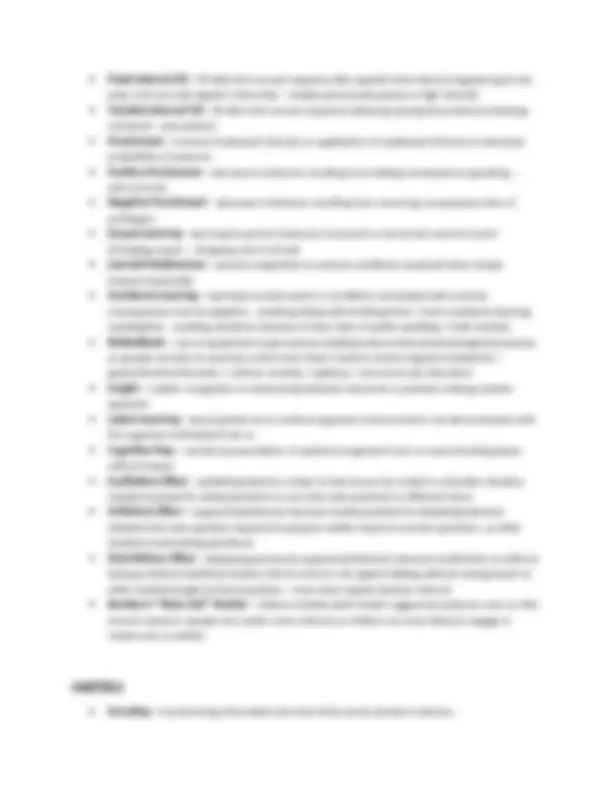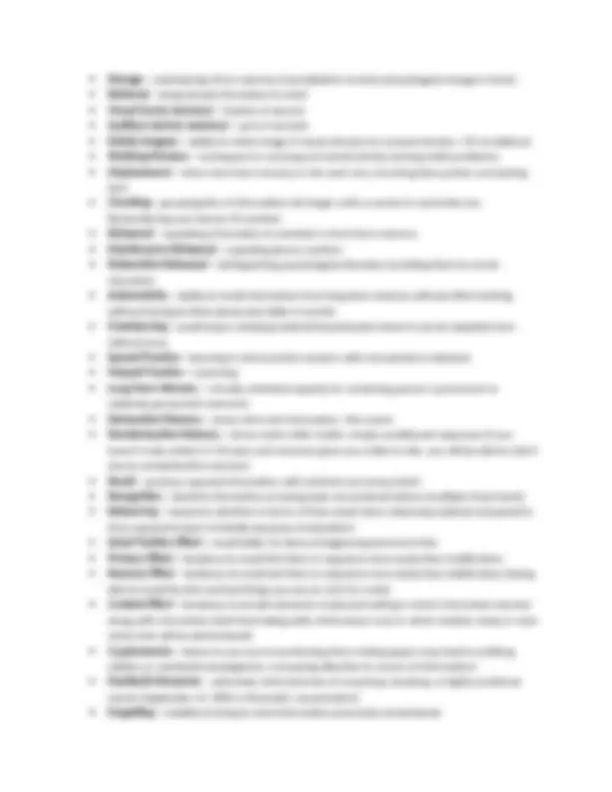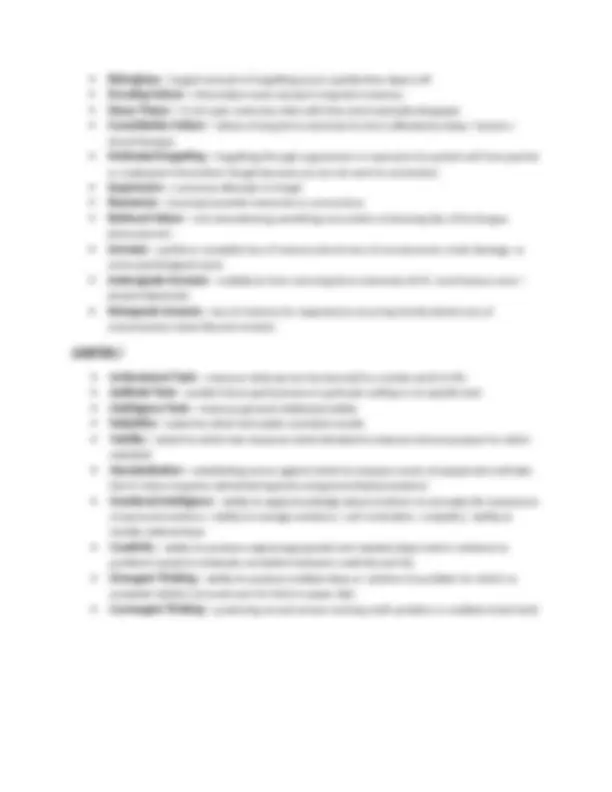





Study with the several resources on Docsity

Earn points by helping other students or get them with a premium plan


Prepare for your exams
Study with the several resources on Docsity

Earn points to download
Earn points by helping other students or get them with a premium plan
Community
Ask the community for help and clear up your study doubts
Discover the best universities in your country according to Docsity users
Free resources
Download our free guides on studying techniques, anxiety management strategies, and thesis advice from Docsity tutors
An overview of various concepts related to learning theory and memory, including conditioning, encoding, storage, and retrieval. Topics covered include conditioned stimuli and responses, generalization and discrimination, biological predispositions, taste aversions, thorndike's law of effect, shaping, punishment, escape learning, learned helplessness, avoidance learning, biofeedback, insight, latent learning, cognitive map, and various memory phenomena such as serial position effect, context effect, and forgetting.
Typology: Study notes
1 / 5

This page cannot be seen from the preview
Don't miss anything!




Consciousness – everything of which person aware at any given time (thoughts, feelings, sensations, external environment) Circadian Rhythm – regular fluctuation from high to low points of certain bodily functions and behaviors within 24-hour cycle (regulates all vital life functions and psychological functions like learning efficiency and mood) Subjective Night – time during 24-hour period when biological clock tells person to sleep Restorative Theory of Sleep – function of sleep to restore body and mind Circadian Theory of Sleep – sleep evolved to keep humans safe during night NREM Sleep – slow respiration and hear rate / little body movement / low blood pressure and brain activity REM Sleep – rapid eye movements / paralysis of large muscles / fast, irregular heart and respiration rates / increased brain activity / vivid dreams Parasomnias – behaviors and physiological states that normally occur only in waking state take place during sleep Somnambulism – (sleep walking) occurs during partial arousal from stage 4 sleep Somniloquy – (sleep talking) can occur in any stage Sleep Terrors – sleeper awakes in panicked state during stage 4 sleep Nightmares – frightening dreams during REM sleep Dyssomnias – disorders in which timing, quantity, or quality of sleep impaired Narcolepsy – disorder characterized by excessive daytime sleepiness and attacks of REM sleep Sleep Apnea – disorder in which breathing stops during sleep Insomnia – difficulty falling or staying asleep / waking too early / light, restless, or poor quality of sleep REM Dreams – story-like quality / more visual, vivid and emotional than NREM dreams NREM Dreams – less frequent and memorable than REM dreams Lucid Dreaming – steps that enable dreamers to control content of dreams (may help alleviate depression) Manifest Content – content of dreams as recalled by dreamers Latent Content – underlying meaning of dreams Activation-synthesis Theory of Dreaming – dreams brain’s attempt to make sense of random firing of brain cells during REM sleep Evolutionary Theory of Dreaming – vivid REM dreams enable people to rehearse skills needed to deal with threatening events Hypnosis – procedure using power of suggestion to change thoughts, feelings, sensations, perceptions, or behavior Substance Abuse – continued use of a substance after episodes in which use has negatively affected work, education, and social relationships Physical Drug Dependence – compulsive pattern of drug use in which user develops drug tolerance Drug Tolerance – user less affected so larger doses required for effect
Withdrawal Symptoms – physical and psychological symptoms when drug use discontinued Psychological Drug Dependence – craving or irresistible urge for drug’s pleasurable effects (more difficult to overcome than physical dependence) CHAPTER 5 Stimulus (S) – any event or object in environment to which organism responds Unconditioned Stimulus (US) – elicits unconditioned response without learning (food / loud noise / light in eye / puff of air in eye) Unconditioned Response (UR) – response elicited by unconditioned stimulus without learning (salivation / startle response / contractions of pupil / eyeblink) Conditioned Stimulus (CS) – neutral stimulus that, after repeated pairing with unconditioned stimulus, becomes associated with it and elicits conditioned response (tone / buzzer / bell) Conditioned Response (CR) – learned response elicited by conditioned stimulus (salivation to tone) Generalization – tendency to make conditioned response to stimulus similar to conditioned stimulus (sounds like alarms) Discrimination – learned ability to distinguish between similar Ss so that conditioned response occurs only to original conditioned stimulus, not to similar Ss (odors distinguish spoiled food / visual discriminations of harmful objects) Biological Predispositions – organisms biologically predisposed to acquire classically conditioned associations that enhance chances for survival Taste Aversions – foods you do not like or like to be around Edward Thorndike’s Law of Effect – consequence, or effect, of response determines whether tendency to respond in same way in future strengthened or weakened (ex. Organisms tend to repeat behaviors that bring about pleasant consequences) Shaping – gradually molding desired response by reinforcing any movement in direction desired response (animal models – writing or learning language [the example of Spanish and French]) Positive Reinforcement (+Rf) – pleasant or desirable consequence that increases probability that response will be repeated (A on test = praise) Negative Reinforcement ( - Rf) – termination of unpleasant condition following response that increases probability that response will be repeated (fastening seatbelt – giving in to whining; when you have a headache, you take a pain reliever = negative reinforcement) Primary Reinforcer – reinforcer that fulfills basic physical need and does not depend on learning (food and water, air, sex) Secondary Reinforcer – reinforcer acquired or learned through association with other reinforcers (money, getting praised) Fixed-Ratio (FR) – Rf after fixed number of correct, nonreinforced Rs (piecework in factories or sales – praise every third time homework on time) Variable-Ratio (VR) – Rf after varying number of nonreinforced Rs (slot machines – praise for homework completion varies; after 1, then 3, then 2,…)
Storage – maintaining info in memory (consolidation involves physiological change in brain) Retrieval – bring stored information to mind Visual (iconic memory) – fraction of second Auditory (echoic memory) – up to 2 seconds Eidetic Imagery – ability to retain image of visual stimulus for several minutes / 5% of children) Working Memory – workspace for carrying out mental activity (solving math problems) Displacement – when short term memory is full, each new, incoming item pushes out existing item Chunking – grouping bits of information into larger units so easier to remember (ex. Remembering your banner ID number) Rehearsal – repeating information to maintain in short term memory Maintenance Rehearsal – repeating phone numbers Elaborative Rehearsal – distinguishing psychological disorders by linking them to movie characters Automaticity – ability to recall information from long-term memory without effort (writing without having to think about each letter in words) Overlearning – practicing or studying material beyond point where it can be repeated once without error Spaced Practice – learning in short practice sessions with rest periods in between Massed Practice – cramming Long Term Memory – virtually unlimited capacity for containing person’s permanent or relatively permanent memories Declarative Memory – stores facts and information / life events Nondeclarative Memory – stores motor skills, habits, simple conditioned responses (if you haven’t rode a bike in 5-10 years and someone gives you a bike to ride, you will be able to ride it due to nondeclarative memory) Recall – produce required information with minimal cues (essay tests) Recognition – identify information as having been encountered before (multiple choice tests) Relearning – measures retention in terms of time saved when relearning material compared to time required to learn it initially (purpose of education) Serial Position Effect – recall better for items at beginning and end of lists Primary Effect – tendency to recall first items in sequence more easily than middle items Recency Effect – tendency to recall last items in sequence more easily than middle items (being able to recall the first and last things you see on a list for a test) Context Effect – tendency to encode elements of physical setting in which information learned along with information itself (test-taking skills; think about room in which studied; study in room where test will be administered) Cryptomnesia – failure to use source monitoring when writing papers may lead to omitting citation or unintentional plagiarism; not paying attention to source of information) Flashbulb Memories – extremely vivid memories of surprising, shocking, or highly emotional events (September 11, 2001 or Kennedy’s assassination) Forgetting – inability to bring to mind information previously remembered
Ebbinghaus – largest amount of forgetting occurs quickly then tapers off Encoding Failure – information never stored in long term memory Decay Theory – if not used, memories fade with time and eventually disappear Consolidation Failure – failure of long term memories to form (affected by sleep / trauma / shock therapy) Motivated Forgetting – forgetting through suppression or repression to protect self from painful or unpleasant information (forget because you do not want to remember) Suppression – conscious attempts to forget Repression – burying traumatic memories in unconscious Retrieval Failure – not remembering something one certain of knowing (tip of the tongue phenomenon) Amnesia – partial or complete loss of memory due to loss of consciousness, brain damage, or some psychological cause Anterograde Amnesia – inability to form new long term memories (H.M. most famous case = alcohol blackouts) Retrograde Amnesia – loss of memory for experiences occurring shortly before loss of consciousness (Jason Bourne movies) CHAPTER 7 Achievement Tests – measure what person has learned to a certain point in life Aptitude Tests – predict future performance in particular setting or on specific task Intelligence Tests – measure general intellectual ability Reliability – extent to which test yields consistent results Validity – extent to which test measures what intended to measure (serves purpose for which selected) Standardization – establishing norms against which to compare scores of people who will take test in future (requires administering tests using prescribed procedure) Emotional Intelligence – ability to apply knowledge about emotions to everyday life (awareness of personal emotions / ability to manage emotions / self–motivation / empathy / ability to handle relationships) Creativity – ability to produce original appropriate and valuable ideas and/or solutions to problems (weak to moderate correlation between creativity and IQ) Divergent Thinking – ability to produce multiple ideas or solutions to problem for which no accepted solution (unusual uses for brick or paper clip) Convergent Thinking – producing correct answer (solving math problem or multiple choice test)